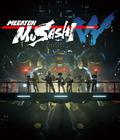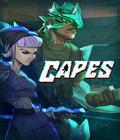We are in a new age for the guitar-centric era of the music game genre. The novelty of plugging in a real guitar to play a music game is no longer as strong as it once was, and the Rocksmith games have proven it's possible to transition from Rock Band to real instruments. In that regard, Bandfuse: Rock Legends feels like the first truly successful completion of that goal, and it's the first title to bridge the gap between game-based guitar playing and the ability to play one without a game at all.
From a technical standpoint, Bandfuse doesn't function much differently than the Rocksmith franchise. You connect your guitar (or bass guitar) to the system using a specific 1/4"-to-USB adapter, and you must have the console set up to either use RCA or optical audio, since HDMI induces latency between playing and hearing a note. The USB cables for the two franchises do not work with one another, so you need to get the ones specific to Bandfuse and vice versa. Newcomers to guitar-based games who haven't played a guitar before don't need to worry, as the game starts off with a series of screens and videos detailing optimum configuration to get the best performance from the game.
The biggest change that Bandfuse brings to the table is dropping any resemblance to the Rock Band style of vertical notes scrolling down a highway. Instead, it uses true guitar tablature to represent the notes you need to play. This tablature is essentially the same format as any old guitar tab book you'll find at a music shop, and it scrolls horizontally just as you would read printed tab. This choice alone is worthy of praise, as it genuinely helps prepare you for playing the guitar outside of the game just as well as it teaches you within the game. For the most part, what you learn translates fully between the two.
That's not to say that it's necessarily an easy transition to make. I consider myself a middle-of-the-road guitar player, and I found the style pretty easy to pick up after a song or two, but I had the ability to read tablature beforehand. Novice players may find the setup a lot more intimidating, though the game does a great job of explaining it. Surprisingly, a more veteran guitar player friend of mine tried the game and remarked that the tabs moving "freaked him out." I'd imagine that novice players may struggle with the "real tablature" portion of the equation while experienced players may find their initial issues with the "game-friendly" side, but after a couple of songs, it should click for most players.
To help the player with the transition, the game still makes use of the color-coded finger placement from the Rock Band titles. Though the game show a note such as "2" to signify second fret, the outline around it is either green, red, yellow, blue, or purple. The color signifies which finger is suggested for playing that note, and is in the same order as all of the plastic guitars. The only difference is purple, which signifies a "0" (or open) note in which no fret is depressed on that string when the note is played. Finally, the outline of the note determines the type of note, whether it's simple notes, sustained notes, or more complex actions, such as slides, hammer-ons, pull-offs, chords, etc.
To play the game, you can enter the tour mode or use quick play to make a playlist of one or more songs, but either mode can be played with up to four players. Tour mode consists of tours, which are a series of alternating concerts and challenges culminating in a festival. Concerts are two or more songs from the game's library that fit the tour's theme, while challenges are one song on which you must earn five stars at or above a set difficulty level. Finally, festivals are essentially longer versions of the concerts in which you consecutively play every song from that tour.
Bandfuse is a series of incredibly smart decisions, with one of them the prompt to change difficulty levels between each song of a tour/playlist. This allows you to step up the difficulty for songs you know well but scale it back for the ones you're still learning. The game also prompts you to tune between every song, but if it's the same tuning, you can press a button to bypass it. For an electric guitar, the game is smart enough to handle polyphonic tuning. This means that you can strum all six strings and, assuming you are in tune, the game accepts the tuning automatically.
Still, newcomers to playing the guitar will find everything to be imposing because it's a lot to take in. For those who want to jump right in, there are five difficulty levels, from "Easy" right up to "Real," which is note-for-note faithful to the original song. On easier difficulties, chords become single notes, and there are fewer notes, so you can locate the correct frets and strings and learn proper finger placement. The game difficulty does not scale up and down on its own as it does in Rocksmith, but it seems to get just a little harder near the end of the song, right about the time when you're about comfortable enough to do so.
For those who want to take a more studious approach, the Shred U feature is filled with teaching aids. You can watch videos filmed with guitar experts such as Slash teaching everything from how to attach a guitar strap to how to tackle much more advanced concepts. The Lick Lab lets you learn individual parts of a song at a number of speeds, including note-for-note, which only advances to the next note after you've hit the prior one. This lets you pick out a section of a song piece by piece and then gradually increase the speed as you successfully hit the notes. It's a great learning tool for particularly tricky songs.
The game features the ability to plug in a microphone and sing along, and it's implemented quite well. Vocals come through surprisingly crisply, even on an old USB microphone from Rock Band, and it's scored in much the same way. More importantly, the game is the first to allow for a single player to play an instrument and sing and have the two scored as a single person. You could always do this in other games by signing in with a dummy profile on another controller, but it's nice to do so as a supported option.
Most importantly, the game is an absolute blast. My wife came into the game as a novice guitarist, and within minutes of play, it was decided that Bandfuse: Rock Legends has dethroned Rock Band as our go-to music game in the house. It's one thing to say that the game is a polished example of a music game, but the title really strives to bring the player into the realm of true guitar play. That it guides the player along with such a deft touch is nothing short of commendable.
This brings us to the obvious question: Rocksmith or Bandfuse? Rocksmith is a solid game and does a great job of teaching you how to play it, but that knowledge doesn't transfer outside of that particular franchise. Though Bandfuse has a higher learning curve because of its tablature note format, it prepares you to play the game and the stand-alone instrument. Bandfuse is easily the most successful approach to learning how to play a guitar, but it's also damn fun for guitarists of all skill levels.
Score: 9.4/10
More articles about BandFuse: Rock Legends











 Letting gamers plug in a real guitar and casually strum along with their favorite songs or master the techniques of the world's most iconic guitarists, BandFuse: Rock Legends gives players the chance to experience their favorite songs like never before.
Letting gamers plug in a real guitar and casually strum along with their favorite songs or master the techniques of the world's most iconic guitarists, BandFuse: Rock Legends gives players the chance to experience their favorite songs like never before.







































